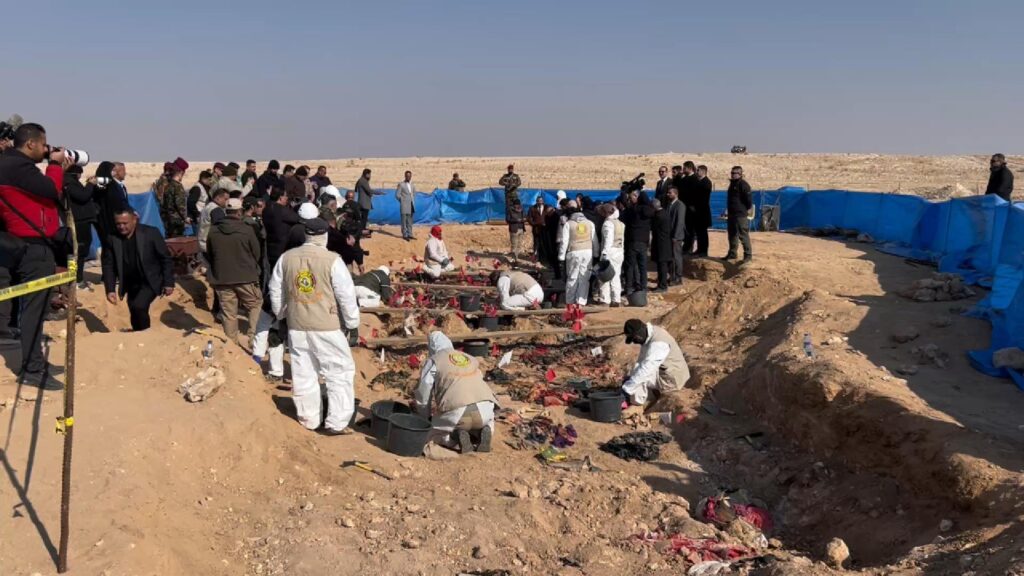Iraqi ministers vow more services in Kirkuk visit with acting governor

“Kirkuk, since the imposition of the law, fares through perfect security. There is perfect co-existence. We also have our eyes on rebuilding, the return of services to the liberated areas throughout the province," Kirkuk acting Governor Rakan al-Jabouri told reporters following their meeting in Kirkuk on Sunday.
Iraqi ministers and officials on Sunday visited Kirkuk upon the request of Prime Minister Adil Abdul-Mahdi to discuss a number of stalled projects and more promised initiatives.
Jabouri met with Oil Minister Thamer al-Ghadhban, Electricity Minister Luai al-Khatib, Water Minister Jamal al-Adili, Interior Ministry undersecretary Aqil al-Khazali, and the head of the Coordination Committee Between Provinces Tourhan al-Mufti.
Ghadhban stressed the importance of Kirkuk for the federal government.
"Thank God, it is enjoying peace and security. However, it is important for us that the conditions of the city of Kirkuk and for the Kirkuk province to be the best possible, whether on the level of services, including water, electricity, and oil derivatives, in addition to the other services," he told reporters.
Ghadhban "promised" they would do all they can do to meet the "legitimate requests" of Jabouri, Kirkuk MPs, and the province’s council members.
Jabouri’s proposals included renovating the Kirkuk-Baghdad road, rebuilding destroyed villages, more electricity plants, more fuel and employment for Kirkuk's people, according to a readout published on Jabouri's Facebook page.
He also demanded speeding up the construction of a 150,000 bpd oil refinery, resuming hydrogenation and the refining of fuel with a capacity of 12,000 bpd, finishing 492-bed Southern Kirkuk Hospital, building the 200-bed Japanese Hospital, renovating the Kirkuk-Baghdad road, the return of displaced people from Kirkuk, and the completion of the United Kirkuk Water Project that is 88 percent done.
Jabouri added that destroyed villages a need reconstructed, the sewage project completed, and three neighborhoods in Kirkuk need services rehabbed, and security forces need to be improved with additional vehicles and weaponry.
Ghadban revealed the federal government will increase the province’s fuel and gas share this summer, especially for directorates and hospitals.
"We have decided to form a coordination committee for oil sector institutions, headed by the director general of Northern Oil [Company], that cooperates with the governor of Kirkuk, provincial council members for the purpose of implementing projects for societal benefits," he said per a readout from Jabouri’s Facebook page.
The delegation also visited the commercial airport being built in Kirkuk for domestic travel.
Khatib, according to a readout from his office, met with his local employees.
"The government supports the province through building its capabilities in implementing projects and providing services to the people,” Khatib told the workers.
The minister also met with the deputy governor for technical affairs and some provincial council members to discuss relevant preparations for this summer. They also studied Jabouri’s request to increase their electricity share.
Khatib "directed" the northern branch of the Electricity Generation Public Company to "negotiate" with Iran’s’ Sunir Company to finish the gas-supplied Dibis Power Plant with a capacity of 320 megawatts. Of the project, 65 percent is complete. Sun Niroo Soroush Company (Sunir) is in Isfahan, Iran, and was established 9 years ago.
Iran sells billions of dollars of electricity to Iraq annually, and it has sought to reinforce its position in the Iraqi sector as US sanctions bite.
However, the United States granted Iraq three waivers to wean itself off of Iranian electricity and gas imports, but it is unlikely to be granted fourth. According to Iranian media outlets, Iranian companies are active in Syria and Iraq post-ISIS in their electricity sectors. In February, Iraq and Iran signed more contracts for Tehran to continue supplying electricity.
The recent designation of Iran’s Islamic Revolutionary Guard Corps (IRGC) as a foreign terrorist organization by the United States complicates matters for Iraq further. The IRGC and its affiliates are heavily entrenched in the Islamic Republic’s various sectors. Many Iraqi companies, people, and entities are known to have ties with the IRGC.
The minister also discussed a Russian investment project in Dibis electricity. The project by OJSC Power Machines includes two power plants, each with a production capacity of 160 megawatts.
Jabouri’s readout says he requested for the Dibis project by the Iranian company to be completed and for the Russian power plant to be "reconsidered."
Provincial council members shut out of meeting
Kirkuk Provincial Council members held a press conference outside the provincial council building, protesting the measures taken by the visiting delegation. The councilors were barred from entering the building on Monday and working.
“These behaviors are unacceptable and irresponsible, and the necessary measures will be taken and the parliament spoken to through their representative to limit the efforts aimed at minimizing the oversight role of the council in the province,” a readout from the provincial council’s Facebook page states.
The provincial council, with a majority of members hailing from the Kurdistan Democratic Party (KDP) and Patriotic Union of Kurdistan (PUK), has been disgruntled with the work of Jabouri. He was appointed by former Prime Minister Haider al-Abadi who sacked Kurdish governor Najmaldin Karim following the events of October 2017.
Last week, council members expressed dismay at Jabouri’s plans to use half of the province’s petrodollar for projects. They said they would further study Jabouri’s proposals.
Kirkuk, a disputed or Kurdistani province claimed by Erbil and Baghdad, holds around 10 percent of Iraq’s total oil reserves estimated at 140 billion barrels.
Jabouri, also an elected Iraqi MP, is in hot water with Iraq’s Integrity Commission. Baghdad issued an arrest warrant on Jabouri for allegedly failing to take appropriate legal measures concerning goods confiscated at Kirkuk's customs zones in 2016.
Iraq’s Federal Court has rescinded decrees made Jabouri who authorized the appropriation of Kurdish lands. Kurds have claimed that Jabouri, an Arab, has re-initiated Saddam Hussein-era Arabization policies.

